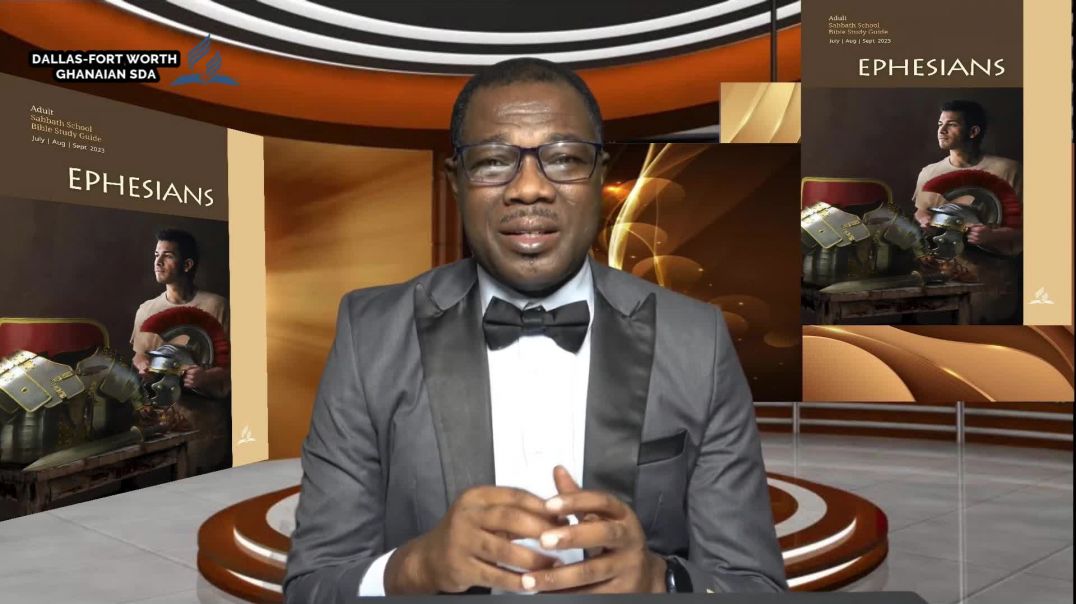Sabbath Afternoon, December 9
The fall of man filled all heaven with sorrow. . . . Angels
ceased their songs of praise. Throughout the heavenly
courts there was mourning for the ruin that sin had
wrought.
The Son of God, heaven’s glorious Commander, was
touched with pity for the fallen race. His heart was
moved with infinite compassion as the woes of the lost
world rose up before Him. But divine love had conceived
a plan whereby man might be redeemed. The broken
law of God demanded the life of the sinner. In all the
universe there was but one who could, in behalf of man,
satisfy its claims. Since the divine law is as sacred as God
Himself, only one equal with God could make atonement
for its transgression. None but Christ could redeem
fallen man from the curse of the law and bring him again
into harmony with Heaven. . . . Christ would reach to the
depths of misery to rescue the ruined race.—Patriarchs
and Prophets, p. 63.
We should cultivate the spirit with which Christ
labored to save the erring. They are as dear to Him as we
are. They are equally capable of being trophies of His
grace and heirs of the kingdom. But they are exposed to
the snares of a wily foe, exposed to danger and
defilement, and without the saving grace of Christ, to
certain ruin. Did we view this matter in the right light,
how would our zeal be quickened and our earnest, selfsacrificing efforts be multiplied, that we might come
close to those who need our help, our prayers, our
sympathy, and our love! . . .
Those only live for Christ and honor His name who are
true to their Master in seeking to save that which is lost.
Genuine piety will surely manifest the deep longing and
earnest labor of the crucified Saviour to save those for
whom He died. If our hearts are softened and subdued
by the grace of Christ, and glowing with a sense of God’s
goodness and love, there will be a natural outflow of
love, sympathy, and tenderness to others. The truth
exemplified in the life will exert its power, like the
hidden leaven, upon all with whom it is brought in
contact.—Testimonies for the Church, vol. 5, pp. 605, 606.
Man is God’s property, and angels are looking with
intense interest to see how man will deal with his fellow
man. When heavenly intelligences see those who claim
to be the sons and daughters of God putting forth
Christlike efforts to help the erring, manifesting a
tender, sympathetic spirit for the repentant and the
fallen, angels press close to them and bring to their
remembrance the very words that will soothe and uplift
the soul. Holy angels are on the track of every one of us.
We are not to despise the least of [these].—In Heavenly
Places, p. 100.
Sunday, December 10
Mission to Regions Beyond
Christ says, “As Thou hast sent Me into the world, even
so have I also sent them into the world” (John 17:18). . . .
Every soul whom Christ has rescued is called to work in
His name for the saving of the lost. . . .
When you turn from those who seem unpromising and
unattractive, do you realize that you are neglecting the
souls for whom Christ is seeking? At the very time when
you turn from them, they may be in the greatest need of
your compassion. In every assembly for worship, there
are souls longing for rest and peace. They may appear to
be living careless lives, but they are not insensible to the
influence of the Holy Spirit. Many among them might be
won for Christ.—Christ’s Object Lessons, p. 191.
All heaven is interested in the work of saving the lost.
Angels watch with intense interest to see who will leave
the ninety and nine and go out in tempest and storm and
rain into the wild desert to seek the lost sheep. The lost
are all around us, perishing and sadly neglected. But
they are of value to God, the purchase of the blood of
Christ.—In Heavenly Places, p. 100.
As you engage in this work, [ministering to the lost],
you have companions unseen by human eyes. Angels of
heaven were beside the Samaritan who cared for the
wounded stranger. Angels from the heavenly courts
stand by all who do God’s service in ministering to their
fellow men. And you have the co-operation of Christ
Himself. He is the Restorer, and as you work under His
supervision, you will see great results. . . .
Christ is seeking to uplift all who will be lifted to
companionship with Himself, that we may be one with
Him as He is one with the Father. He permits us to come
in contact with suffering and calamity in order to call us
out of our selfishness; He seeks to develop in us the
attributes of His character—compassion, tenderness,
and love. By accepting this work of ministry we place
ourselves in His school, to be fitted for the courts of
God.—Christ’s Object Lessons, p. 388.
[The Savior] has committed to His followers a worldwide mission. In the days of Christ, selfishness and pride
and prejudice had built strong and high the wall of
partition between the appointed guardians of the sacred
oracles and every other nation on the globe. But the
Saviour had come to change all this. . . . Christ tears away
the wall of partition, the self-love, the dividing prejudice
of nationality, and teaches a love for all the human
family. He lifts men from the narrow circle that their
selfishness prescribes; He abolishes all territorial lines
and artificial distinctions of society. He makes no
difference between neighbors and strangers, friends and
enemies. He teaches us to look upon every needy soul as
our neighbor and the world as our field.—Thoughts
From the Mount of Blessing, p. 42.
Monday, December 11
Seeking the Multitudes
Jesus went up into a mountain, and there the
multitude flocked to Him, bringing their sick and lame,
and laying them at His feet. He healed them all; and the
people, heathen as they were, glorified the God of Israel.
For three days they continued to throng about the
Saviour, sleeping at night in the open air, and through
the day pressing eagerly to hear the words of Christ, and
to see His works. At the end of three days their food was
spent. Jesus would not send them away hungry, and He
called upon His disciples to give them food.
Again the disciples revealed their unbelief. At
Bethsaida they had seen how, with Christ’s blessing,
their little store availed for the feeding of the multitude;
yet they did not now bring forward their all, trusting His
power to multiply it for the hungry crowds. Moreover,
those whom He fed at Bethsaida were Jews; these were
Gentiles and heathen. Jewish prejudice was still strong
in the hearts of the disciples, and they answered Jesus,
“Whence can a man satisfy these men with bread here in
the wilderness?” But obedient to His word they brought
Him what they had,—seven loaves and two fishes. The
multitude were fed, seven large baskets of fragments
remaining. Four thousand men, besides women and
children, were thus refreshed, and Jesus sent them away
with glad and grateful hearts.—The Desire of Ages, p.
404.
We are not, as a people, sufficiently aroused to the
short time in which we have to work, and we do not
understand the magnitude of the work for the time.
The night soon cometh, in which no man can work.
God calls for men and women to qualify themselves, by
consecration to His will and earnest study of the
Scriptures, to do His special work for these last days. He
calls for men now who can work. As they engage in the
work in sincerity and humility to do all they can, they
will be obtaining a more thorough experience. They will
have a better knowledge of the truth and better know
how to reach souls and help them just where they need
to be helped. Workmen are needed now, just now, to
labor for God. The fields are already white for the
harvest, and yet laborers are few.—Life Sketches of Ellen
G. White, p. 211.
There is a possibility of the believer in Christ obtaining
an experience that will be wholly sufficient to place him
in right relation to God. Every promise that is in God’s
Book holds out to us the encouragement that we may be
partakers of the divine nature. This is the possibility—to
rely upon God, to believe his Word, to work his works. . .
. This possibility is worth more to us than all the riches
in the world. There is nothing on earth that can compare
with it. As we lay hold of the power thus placed within
our reach, we receive a hope so strong that we can rely
wholly upon God’s promises; and laying hold of the
possibilities there are in Christ, we become the sons and
daughters of God.—Review and Herald, January 14, 1909.
Tuesday, December 12
In Tyre and Sidon
Looking westward, [Jesus] could see, spread out upon
the plain below, the ancient cities of Tyre and Sidon,
with their heathen temples, their magnificent palaces
and marts of trade, and the harbors filled with shipping.
Beyond was the blue expanse of the Mediterranean, over
which the messengers of the gospel were to bear its glad
tidings to the centers of the world’s great empire. But
the time was not yet. The work before Him now was to
prepare His disciples for their mission. . . .
The people of this district were of the old Canaanite
race. They were idolaters, and were despised and hated
by the Jews. To this class belonged the woman who now
came to Jesus. She was a heathen, and was therefore
excluded from the advantages which the Jews daily
enjoyed. There were many Jews living among the
Phoenicians, and the tidings of Christ’s work had
penetrated to this region. . . .
Christ knew this woman’s situation. He knew that she
was longing to see Him, and He placed Himself in her
path. By ministering to her sorrow, He could give a living
representation of the lesson He designed to teach. For
this He had brought His disciples into this region. He
desired them to see the ignorance existing in cities and
villages close to the land of Israel. The people who had
been given every opportunity to understand the truth
were without a knowledge of the needs of those around
them. No effort was made to help souls in darkness. The
partition wall which Jewish pride had erected, shut even
the disciples from sympathy with the heathen world. But
these barriers were to be broken down.—The Desire of
Ages, pp. 399, 400.
During His earthly ministry Christ began to break
down the partition wall between Jew and Gentile, and to
preach salvation to all mankind. Though He was a Jew,
He mingled freely with the Samaritans, setting at nought
the Pharisaic customs of the Jews with regard to this
despised people. He slept under their roofs, ate at their
tables, and taught in their streets.
The Saviour longed to unfold to His disciples the truth
regarding the breaking down of the “middle wall of
partition” between Israel and the other nations—the
truth that “the Gentiles should be fellow heirs” with the
Jews and “partakers of His promise in Christ by the
gospel.” Ephesians 2:14; 3:6. This truth was revealed in
part at the time when He rewarded the faith of the
centurion at Capernaum, and also when He preached the
gospel to the inhabitants of Sychar. Still more plainly
was it revealed on the occasion of His visit to Phoenicia,
when He healed the daughter of the Canaanite woman.
These experiences helped the disciples to understand
that among those whom many regarded as unworthy of
salvation, there were souls hungering for the light of
truth.—The Acts of the Apostles, p. 19.
Wednesday, December 13
“Send Her Away!”
The Saviour manifested divine compassion toward the
Syrophenician woman. His heart was touched as He saw
her grief. He longed to give her an immediate assurance
that her prayer was heard; but He desired to teach His
disciples a lesson, and for a time He seemed to neglect
the cry of her tortured heart. When her faith had been
made manifest, He spoke to her words of commendation
and sent her away with the precious boon she had
asked. The disciples never forgot this lesson, and it is
placed on record to show the result of persevering
prayer.
It was Christ Himself who put into that mother’s heart
the persistence which would not be repulsed. It was
Christ who gave the pleading widow courage and
determination before the judge. It was Christ who,
centuries before, in the mysterious conflict by the
Jabbok, had inspired Jacob with the same persevering
faith. And the confidence which He Himself had
implanted, He did not fail to reward.—Christ’s Object
Lessons, p. 175.
Jesus knows the burden of every mother’s heart. He
who had a mother that struggled with poverty and
privation, sympathizes with every mother in her labors.
He who made a long journey in order to relieve the
anxious heart of a Canaanite woman will do as much for
the mothers of today. He who gave back to the widow of
Nain her only son, and in His agony upon the cross
remembered His own mother, is touched today by the
mother’s sorrow. In every grief and every need, He will
comfort and help. . . .
In the children who were brought in contact with Him,
Jesus saw the men and women who should be heirs of
His grace and subjects of His kingdom, and some of
whom would become martyrs for His sake. He knew that
these children would listen to Him and accept Him as
their Redeemer far more readily than would grown-up
people, many of whom were the worldly-wise and
hardhearted. In teaching, He came down to their level.
He, the Majesty of heaven, answered their questions and
simplified His important lessons to meet their childish
understanding. He planted in their minds the seeds of
truth, which in after years would spring up and bear
fruit unto eternal life.—The Ministry of Healing, p. 42.
If the lost sheep is not brought back to the fold, it
wanders until it perishes. And many souls go down to
ruin for want of a hand stretched out to save. These
erring ones may appear hard and reckless; but if they
had received the same advantages that others have had,
they might have revealed far more nobility of soul, and
greater talent for usefulness. Angels pity these
wandering ones. Angels weep, while human eyes are dry
and hearts are closed to pity.
O the lack of deep, soul-touching sympathy for the
tempted and the erring! O for more of Christ’s spirit, and
for less, far less, of self!—Christ’s Object Lessons, pp. 191,
192.
Thursday, December 14
Faith on Earth?
As the rays of the sun penetrate to the remotest
corners of the globe, so God designs that the light of the
gospel shall extend to every soul upon the earth. If the
church of Christ were fulfilling the purpose of our Lord,
light would be shed upon all that sit in darkness and in
the region and shadow of death. Instead of congregating
together and shunning responsibility and cross bearing,
the members of the church would scatter into all lands,
letting the light of Christ shine out from them, working
as He did for the salvation of souls, and this “gospel of
the kingdom” would speedily be carried to all the world.
It is thus that God’s purpose in calling His people, from
Abraham on the plains of Mesopotamia to us in this age,
is to reach its fulfillment.—Thoughts From the Mount of
Blessing, pp. 42, 43.
Christ gave up all in order that He might bring
salvation to every people, nation, and tongue. He bridged
the gulf that sin had made, in order that through His
merits man might be reconciled to God. Why is there not
an army of workers enlisted under the bloodstained
banner of Prince Emmanuel, ready to go forth to . . .
bring souls out of darkness into light? Why do we not
teach the perishing to believe in Christ as their personal
Saviour, and aid them to see Christ by faith, and wash in
the fountain that has been opened to cleanse away the
sins of the world? We should teach [them] how to cast
away their old, sin-stained garments of character, and
how to put on Christ’s righteousness. We should plant in
their darkened minds the elevating, ennobling thoughts
of heavenly things. By faith, by Christlike sympathy and
example, we should lead the polluted into pure and holy
lives. We should live such a life before them that they
will discern the difference between error and vice, and
purity, righteousness, and holiness.—The Southern
Work, p. 27.
In large cities there are certain classes that cannot be
reached by public meetings. These must be searched out
as the shepherd searches for his lost sheep. Diligent,
personal effort must be put forth in their behalf. When
personal work is neglected, many precious
opportunities are lost, which, were they improved,
would advance the work decidedly. . . .
Those who desire to investigate the truth need to be
taught to study diligently the word of God. Someone
must help them to build on the sure foundation. At this
critical time in their religious experience, how important
it is that wisely directed Bible workers come to their
help and open to their understanding the treasure house
of God’s word.—Testimonies for the Church, vol. 9, p. 111.
Friday, December 15
For Further Reading
My Life Today, “Love Heals Many Wounds,” p. 179;
Life Sketches of Ellen G. White, “Sowing Beside All
Waters,” pp. 213, 214.
touched with pity for the fallen race. His heart was
moved with infinite compassion as the woes of the lost
world rose up before Him
No comments found








